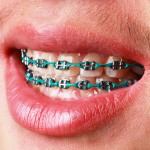
Compliance with oral hygiene measures during orthodontic treatment is important in order to prevent white spot lesions (WSL) developing. The aim of this study was to determine if there is a relationship between reminding patients of the importance of oral hygiene via weekly text message reminders sent to their parents/guardians and demonstrated oral hygiene compliance.
Patients aged 11-9 undergoing full fixed appliances in both arches were randomised to text message or control group. All patients received standardised oral hygiene instruction (OHI) and oral hygiene kit at baseline. Baseline measurements of bleeding index (BI), modified gingival index (MGI), and plaque index (PI), and visual examination of white spot lesion (WSL). Measurements and OHI were taken at 2 (T1) and 4(T2) appointments after baseline.
One parent/guardian of each patient assigned to the text message group received a text message (‘‘This is a message from the VCU Orthodontic Clinic reminding you that it is important to brush your teeth for 3 minutes after every meal or at least 3 times daily. Cleaning your teeth will help to keep them healthy and beautiful’’) once a week at 1715 hours.
42 patients were randomly assigned to the text message (n=21) or control group (n=21). One patient from each group did not complete all the measurements. There were 25 females and 17 males, with a mean age of 14.2 years, ranging from 11 to 18 years.
- T1 and T2 measurements were at two and four appointments after baseline, corresponding to a mean of 2.93 months and 5.44 months for these time points, respectively
- At T1, there were no BI, MGI, or PI differences between the groups.
- At T2, the text group had significantly lower BI (P < .001), MGI (P = .002), and PI (P = .003) scores.
- There were no differences between the groups in prevalence of WSLs at any time point.
[table id=43 /]
The authors concluded
A text message reminder system is effective for improving oral hygiene compliance in orthodontic patients.
Comment.
There is increasing interest in the use of text messaging in healthcare and there have been a number of Cochrane reviews of different aspect of it use. One review by Car et al found that moderate quality evidence that mobile phone text message reminders are more effective than no reminders, and low quality evidence that text message reminders with postal reminders are more effective than postal reminders alone for reducing missed appointments. In another review Vodopivec-Jamsek et al looked at the use of text messaging for preventive care only identifying 4 trials that provided very limited evidence that in certain cases mobile phone messaging interventions may support preventive health care, to improve health status and health behaviour outcomes. The evidence was best in relation to smoking cessation. In this small study of around 6 months duration the target of the text message was the parent/guardian rather than the patient and while the differences found were statistically significant there is a question about whether that are clinically important particularly as group means are presented.
Links
Eppright M, Shroff B, Best AM, Barcoma E, Lindauer SJ. Influence of active reminders on oral hygiene compliance in orthodontic patients. Angle Orthod. 2013 Sep 12. [Epub ahead of print] PubMed PMID: 24028316.
Car J, Gurol-Urganci I, de Jongh T, Vodopivec-Jamsek V, Atun R. Mobile phone messaging reminders for attendance at healthcare appointments. Cochrane Database of Systematic Reviews 2012, Issue 7. Art. No.: CD007458. DOI: 10.1002/14651858.CD007458.pub2.
Vodopivec-Jamsek V, de Jongh T, Gurol-Urganci I, Atun R, Car J. Mobile phone messaging for preventive health care. Cochrane Database of Systematic Reviews 2012, Issue 12. Art. No.: CD007457. DOI: 10.1002/14651858.CD007457.pub2.

http://t.co/mjJts18JjH
I bet text messages would work well with non-orthodontic dental treatment such as routine checkups at the dentist.
Of course, nothing beats a simple phone call the day before to remind patients of an appointment. Works on me.
Hi Mike
The Cochrane review I referenced did suggest that text messages would work for attendance and this dental study from India also indicates improved attendance with messaging.
Prasad S, Anand R. Use of mobile telephone short message service as a reminder: the effect on patient attendance. Int Dent J. 2012 Feb;62(1):21-6. doi: 10.1111/j.1875-595X.2011.00081.x. PubMed